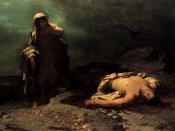The Divine Right of Antigone
The play Antigone is truly a fascinating play, and in some ways more interesting than Oedipus the King, which I read in High School. The character of Antigone reminds me strongly of Oedipus, she is intelligent, fast to make judgements, and like Oedipus, she is followed by tragedy. However, the strongest aspect of Antigone and her tale is what really brings her similarity to Oedipus into sharp focus, they are both righteous people, and just as Oedipus was the hero of Oedipus the King, Antigone is the heroine of her tale. Antigone's decision to disobey Creon and to bury Polynices was valid in that she chose to place her moral, or perhaps divine, self above her physical self.
The entire family of Oedipus is followed eternally by grief! Oedipus's parents virtually exiled him as a child, Oedipus killed his father, Oedipus' actions brought a plague upon Thebes, Oedipus blinded himself, Jocasta hanged herself, Eteocles and Polynices killed each other, Antigone is tried for treason, and finally, Antigone hanged herself.
In Antigone, Polynices and Eteocles have both died prior to the opening of the play, and, in fact, killed each other. At the very beginning of the play, Antigone says:
Do you know one, I ask you, one grief
That Zeus will not perfect for the two of us
While we still live and breathe? There's nothing,
No pain-our lives are pain-no private shame,
No public disgrace, nothing I haven't seen
In your griefs and mine. (1.1, 3-8)
Antigone is faced with a difficult decision, Creon has declared that anyone that attempts to give Polynices a proper burial will be stoned to death in public; but Antigone loves her brother, and she believes that he should be buried. "I will lie with the one I love...



Essay length
Just wanted to add that this essay is 4 pages long when double-spaced.
2 out of 5 people found this comment useful.